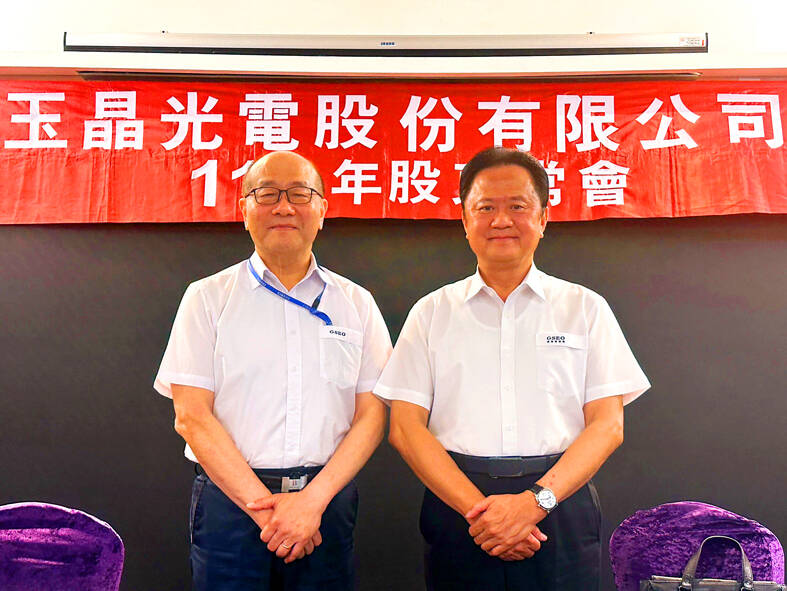Genius Electronic Optical Co (玉晶光), which supplies camera lenses to Apple Inc and Huawei Technologies Co (華為), yesterday gave bullish business prospects for next year, attributable to wider adoption of pricey periscope camera lenses for more smartphones beyond premium models.
That would be a key upgrade in smartphone camera specifications as Genius’ customers at present only equip their flagship phones with such high-end lenses. As customers are mulling expanding the usage of periscope camera lenses to their mid-range models, Genius considers the periscope camera lens business a great boon.
“We are optimistic about the company’s business outlook next year,” Genius chairman Jones Chen (陳天慶) told an online investors’ conference.

Photo: CNA
Genius’ optimism is also built on an upbeat forecast that its Chinese smartphone customers are to see a jump in shipments next year, the company said.
As Genius is seeing an uptrend in demand for its camera lenses used in premium smartphones and some high-end notebook computers, the company is planning to boost the capacity of camera lenses used in mobile phones and virtual-reality (VR) headsets, company president Lee Kuo (郭英理) said.
“Our capacity is really tight now,” Kuo said.
No details about next year’s capital spending were disclosed yesterday, as next year’s budget is still being planned, he said.
Kuo said that VR headsets are a new driving force for its camera lens shipments, as a premium VR headset requires about 10 camera lenses. A mid-range model needs six, while entry-level VR headsets have two or three, he said.
Genius is confident about the outlook of VR devices in the long run, as its customers are developing next-generation products without being discouraged by slow uptake in the initial stage. One of its customers is to unveil a new VR headset next quarter, the company said.
Another customer inked an agreement with China’s Tencent Holdings Ltd (騰訊) to sell its VR headsets in China, which bodes well for the sales, Genius said without identifying Meta as the customer.
VR camera lenses made up about 20 percent of Genius’ total revenue last quarter, it said.
Genius yesterday gave a positive business outlook for this quarter. Revenue this quarter would have better performance than previous fourth quarters in the company’s history, Chen said.
Gross margin this quarter might be higher than last quarter’s 35 percent, attributable to a better yield rate for camera lenses used in VR headsets, he said.
Last quarter’s gross margin fell short of investors’ expectations as the company shipped more VR camera lens modules, which delivered a lower margin due to a less favorable yield rate, smaller production scale and component pass-through costs, the company said.
Commenting on the impact of a patent infringement suit lodged by rival Largan Precision Co (大立光) in Taipei earlier this week, Genius yesterday said the legal disputes did not affect customers’ orders.
Genius said it holds more than 1,000 patents related to the manufacturing of optical products.
Genius’ net profit dipped 21 percent to NT$1.93 billion (US$61 million) during the first three quarters of this year, compared with NT$2.43 billion in the same period last year. Earnings per share dropped to NT$17.02 from NT$21.57.
Gross margin sank to 33.33 percent during the nine-month period, from 38.6 percent in the prior year.

Taiwan Semiconductor Manufacturing Co (TSMC, 台積電) would not produce its most advanced technologies in the US next year, Minister of Economic Affairs J.W. Kuo (郭智輝) said yesterday. Kuo made the comment during an appearance at the legislature, hours after the chipmaker announced that it would invest an additional US$100 billion to expand its manufacturing operations in the US. Asked by Taiwan People’s Party Legislator-at-large Chang Chi-kai (張啟楷) if TSMC would allow its most advanced technologies, the yet-to-be-released 2-nanometer and 1.6-nanometer processes, to go to the US in the near term, Kuo denied it. TSMC recently opened its first US factory, which produces 4-nanometer

PROTECTION: The investigation, which takes aim at exporters such as Canada, Germany and Brazil, came days after Trump unveiled tariff hikes on steel and aluminum products US President Donald Trump on Saturday ordered a probe into potential tariffs on lumber imports — a move threatening to stoke trade tensions — while also pushing for a domestic supply boost. Trump signed an executive order instructing US Secretary of Commerce Howard Lutnick to begin an investigation “to determine the effects on the national security of imports of timber, lumber and their derivative products.” The study might result in new tariffs being imposed, which would pile on top of existing levies. The investigation takes aim at exporters like Canada, Germany and Brazil, with White House officials earlier accusing these economies of

Teleperformance SE, the largest call-center operator in the world, is rolling out an artificial intelligence (AI) system that softens English-speaking Indian workers’ accents in real time in a move the company claims would make them more understandable. The technology, called accent translation, coupled with background noise cancelation, is being deployed in call centers in India, where workers provide customer support to some of Teleperformance’s international clients. The company provides outsourced customer support and content moderation to global companies including Apple Inc, ByteDance Ltd’s (字節跳動) TikTok and Samsung Electronics Co Ltd. “When you have an Indian agent on the line, sometimes it’s hard

PROBE CONTINUES: Those accused falsely represented that the chips would not be transferred to a person other than the authorized end users, court papers said Singapore charged three men with fraud in a case local media have linked to the movement of Nvidia’s advanced chips from the city-state to Chinese artificial intelligence (AI) firm DeepSeek (深度求索). The US is investigating if DeepSeek, the Chinese company whose AI model’s performance rocked the tech world in January, has been using US chips that are not allowed to be shipped to China, Reuters reported earlier. The Singapore case is part of a broader police investigation of 22 individuals and companies suspected of false representation, amid concerns that organized AI chip smuggling to China has been tracked out of nations such